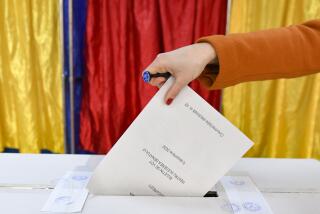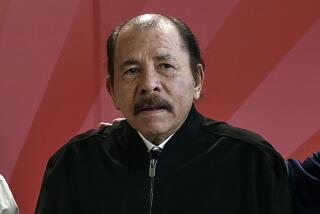Only 28% Back Sandinistas; 9% Favor Opposition : Managuans Split on Regime, Poll Finds
- Share via
MEXICO CITY — Nicaraguans are sharply divided over their government’s performance but believe their country is moving toward greater democracy and oppose further U.S. aid to the Contras, according to the first independent poll in the nine years of the Sandinista revolution.
The survey of 1,129 Managua residents, released Thursday, showed that 28% identify with the Sandinista regime. A larger proportion, but fewer than half, gave high marks to President Daniel Ortega and agreed with some controversial government practices, while only 9% said they supported the political opposition. A copy of the poll was obtained in Mexico City.
Asked to identify the main cause of Nicaragua’s six-year-old war, 47% named the Reagan Administration or its Contra allies, while 16% blamed the Sandinistas. An overwhelming 85% opposed new aid to the rebels, which the Administration is now considering, and 62% rated the U.S. Central American policy “bad or terrible.”
Opposition leaders immediately challenged the poll’s findings, accusing its authors of pro-Sandinista bias. The poll was conducted by the Nicaraguan Institute of Public Opinion, with backing from Jesuit-run Central American University in Managua and the Los Angeles-based Interamerican Research Center.
All three groups are critical of Sandinista policies but generally support the revolution’s goal of transforming society and uplifting the poor. Since 1984, when Ortega was elected, these groups and the Administration have claimed that most Nicaraguans oppose the government.
Although the collapse of the wartime economy has clearly raised the level of anti-government discontent, such claims are hard to judge because the Sandinistas have denied outsiders permission to conduct opinion surveys.
Marvin Ortega, director of the public opinion institute, said he ignored a 1981 law requiring prior authorization for his poll but encountered no interference from Sandinista authorities. Ortega, a Sandinista party member, is not related to the president.
At a news conference in Managua, he said his poll was inspired by the Central American peace agreement, in which the region’s five presidents pledged last August to create “the conditions inherent in any democracy.” Since then, the Sandinistas have lifted a wartime state of emergency, opened peace talks with the Contras and allowed greater freedom for opposition news media and political parties.
Among those polled, 52% said they felt the government was complying with the peace accord. And although 48% said the government is not democratic, against 40% who believe it is, the same percentage said it respects opposition parties, while 39% said it does not.
A total of 57% agreed that the Contras should return to Nicaragua to form political parties, as the government has invited them to do.
“A majority of Nicaraguans see their nation moving toward greater democracy,” the poll’s authors wrote. “Those who are identified with the Sandinista revolutionary program see that project as inherently democratic. Others see Nicaragua’s democratization as uneven but value their country’s progress relative to the situation in El Salvador and Honduras.”
Roger Guevara, secretary of the Nicaraguan Democratic Coordinate, which represents parties that boycotted the 1984 election, said the government has violated the peace accord by turning down several recent requests by the coalition to survey public opinion.
A spokeswoman for the census bureau, Ana Cristina Zeledon, said the government authorizes only those polls it believes are “necessary for the country.”
The survey indicated President Ortega is more popular than his government. While 42% called his performance “good or excellent,” 29% judged it fair. The government’s overall rating was 27% good or excellent and 41% fair.
Opinion divided sharply on two Sandinista practices that the opposition claims are tools of totalitarian political control. Forty-eight percent approved of the Sandinista Defense Committees, which the government calls an instrument of neighborhood democracy, and 47% opposed them. Compulsory military service was favored by 43% and rejected by 53%.
Gilberto Cuadra, vice president of the Superior Council of Businessmen, which opposes the Sandinistas, rejected the poll results as “totally manipulated” and “official propaganda.”
The poll’s authors wrote that they “bent over backward to ensure that the survey was not biased.” For example, they dropped the word Contra from early questionnaire drafts in favor of Nicaraguan Resistance, the name the rebels give their movement.
The interviews were conducted by university students June 4-5.
More to Read
Sign up for Essential California
The most important California stories and recommendations in your inbox every morning.
You may occasionally receive promotional content from the Los Angeles Times.













